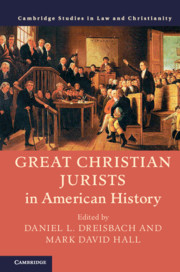Book contents
- Great Christian Jurists in American History
- Law and Christianity
- Great Christian Jurists in American History
- Copyright page
- Dedication
- Contents
- Contributors
- Preface
- Introduction: Christianity and American Law
- 1 John Cotton and Roger Williams
- 2 John Winthrop and the Covenantal Ideal
- 3 Friendly Laws: William Penn’s Christian Jurisprudence
- 4 The Friendly Jurisprudence and Early Feminism of John Dickinson
- 5 Roger Sherman, Oliver Ellsworth, and the Formation of America’s Constitutional Order
- 6 John Jay: The First Chief Justice
- 7 James Wilson
- 8 Was Justice Joseph Story a Christian Constitutionalist?
- 9 Harvard’s Evangelist of Evidence: Simon Greenleaf’s Christian Common Sense
- 10 John Marshall Harlan the Elder
- 11 Judicial Conservatism and Protestant Faith: The Case of Justice David J. Brewer
- 12 John T. Noonan, Jr.: Catholic Jurist and Judge
- 13 The Integrative Christian Jurisprudence of Harold J. Berman
- 14 Antonin Scalia: Devout Christian; Worldly Judge?
- 15 The Insights and Transitions of Mary Ann Glendon
- 16 A Reformed Liberalism: Michael McConnell’s Contributions to Christian Jurisprudence
- 17 The Jurisprudence of Robert P. George
- Index
1 - John Cotton and Roger Williams
Published online by Cambridge University Press: 24 June 2019
- Great Christian Jurists in American History
- Law and Christianity
- Great Christian Jurists in American History
- Copyright page
- Dedication
- Contents
- Contributors
- Preface
- Introduction: Christianity and American Law
- 1 John Cotton and Roger Williams
- 2 John Winthrop and the Covenantal Ideal
- 3 Friendly Laws: William Penn’s Christian Jurisprudence
- 4 The Friendly Jurisprudence and Early Feminism of John Dickinson
- 5 Roger Sherman, Oliver Ellsworth, and the Formation of America’s Constitutional Order
- 6 John Jay: The First Chief Justice
- 7 James Wilson
- 8 Was Justice Joseph Story a Christian Constitutionalist?
- 9 Harvard’s Evangelist of Evidence: Simon Greenleaf’s Christian Common Sense
- 10 John Marshall Harlan the Elder
- 11 Judicial Conservatism and Protestant Faith: The Case of Justice David J. Brewer
- 12 John T. Noonan, Jr.: Catholic Jurist and Judge
- 13 The Integrative Christian Jurisprudence of Harold J. Berman
- 14 Antonin Scalia: Devout Christian; Worldly Judge?
- 15 The Insights and Transitions of Mary Ann Glendon
- 16 A Reformed Liberalism: Michael McConnell’s Contributions to Christian Jurisprudence
- 17 The Jurisprudence of Robert P. George
- Index
Summary
John Cotton and Roger Williams were Puritan ministers in colonial New England. Cotton authored Abstract of the Laws of New England (1641), an early example of American constitutionalism drawing from both scripture and English law. Cotton’s Abstract was adopted by the New Haven colony and influential in the legal systems of Massachusetts Bay and Connecticut. Cotton also became a prominent spokesman for the laws of Massachusetts Bay, and also advocated a particular style of Congregationalism significant for development of American political and legal thought. Roger Williams, once an apprentice and recording secretary for the eminent English jurist Sir Edward Coke, served briefly as a minister in Massachusetts Bay and Plymouth colonies. Exiled for his criticism of the colonial charters and the Puritan partnership of church and state, Williams eventually founded the colony of Rhode Island and served as its President. Williams argued eloquently for religious liberty, provoking Cotton to engage him in a now-famous “Bloudy Tenant” debate published in London and read on both sides of the British Atlantic. Both Cotton and Williams were articulate representatives for opposing sides of a legal question contested as much in colonial America as today, the question of church-state relations and religious liberty.
Keywords
- Type
- Chapter
- Information
- Great Christian Jurists in American History , pp. 16 - 36Publisher: Cambridge University PressPrint publication year: 2019

